搭建小红书首页的瀑布流
我们来尝试使用Kuikly写一下小项目,尝试复刻小红书的首页瀑布流
2.1 查看示例Demo瀑布流
首先克隆Kuikly项目到本地github.com/Tencent-TDS...,并将示例项目运行起来
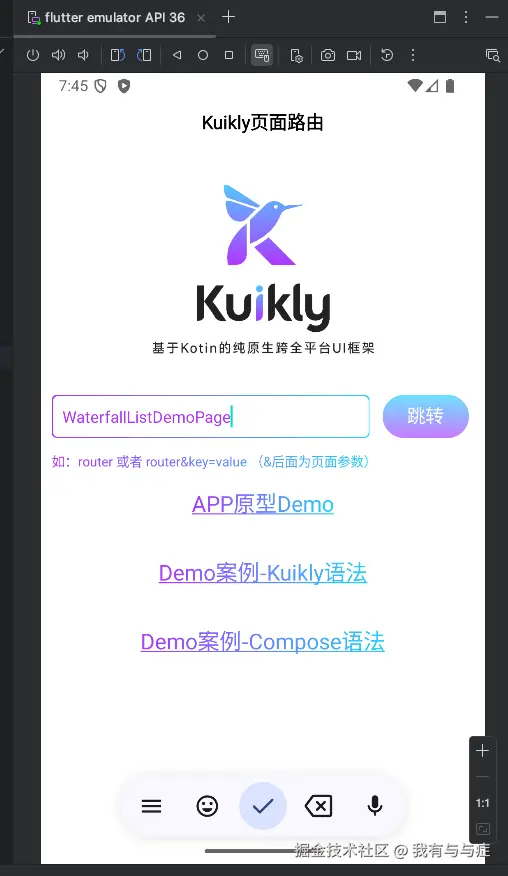
在输入框中输入:WaterfallListDemoPage,并点击跳转,查看瀑布流示例demo 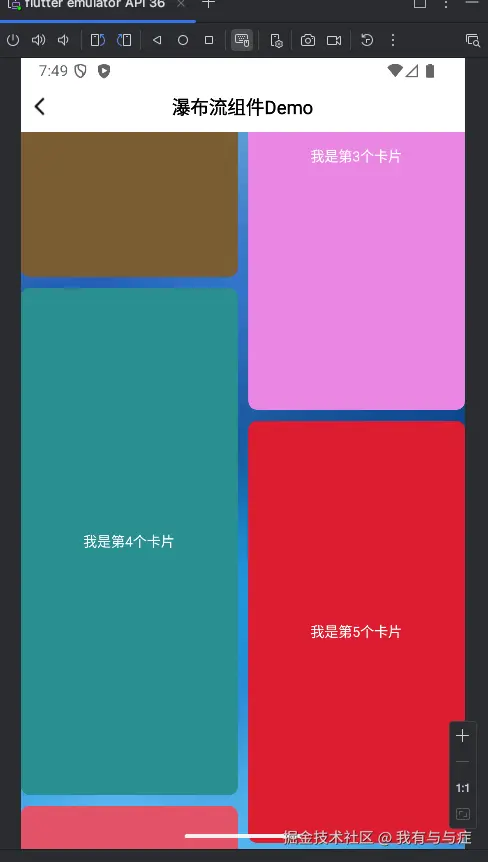
是不是有小红书首页的那味了
查看瀑布流demo的代码,可以看到它使用了WaterfallList组件,并通过随机化卡片的高度实现这种错落有致的信息流效果
kotlin
@Page("WaterfallViewExamplePage")
internal class WaterfallViewExamplePage : BasePager() {
var dataList by observableList<WaterFallItem>()
lateinit var footerRefreshRef : ViewRef<FooterRefreshView>
var footerRefreshText by observable("上拉加载更多")
override fun body(): ViewBuilder {
val ctx = this
return {
attr {
backgroundColor(Color(0xFF3c6cbdL))
}
// 背景图
Image {
attr {
absolutePosition(0f, 0f, 0f, 0f)
src("https://sqimg.qq.com/qq_product_operations/kan/images/viola/viola_bg.jpg")
}
}
// navBar
NavBar {
attr {
title = "WaterfallView Example"
}
}
WaterfallList {
attr {
flex(1f)
columnCount(2)
listWidth(pagerData.pageViewWidth)
lineSpacing(10f)
itemSpacing(10f)
}
// 当view宽度指定和WaterFallList一样宽,则为独占一列布局( 指定宽度超过默认单列宽度,则可独占一列)
View {
attr {
width(pagerData.pageViewWidth)
height(100f)
allCenter()
backgroundColor(Color((0..255).random(), (0..255).random(), (0..255).random(), 1.0f))
}
Text {
attr {
color(Color.WHITE)
text("我是Banner")
fontSize(16f)
}
}
}
vfor({ ctx.dataList }) { item ->
View {
attr {
allCenter()
height(item.height)
backgroundColor(item.bgColor)
borderRadius(8f)
}
Text {
attr {
text(item.title)
color(Color.WHITE)
}
}
event {
click {
this@View.attr {
height((150..300).random().toFloat())
}
}
}
}
}
// 加载更多组件
vif({ctx.dataList.isNotEmpty()}) {
FooterRefresh {
ref {
ctx.footerRefreshRef = it
}
attr {
preloadDistance(600f)
allCenter()
width(ctx.pageData.pageViewWidth) // 指定宽度超过默认单列宽度,则可独占一列
height(60f)
}
event {
refreshStateDidChange {
when(it) {
FooterRefreshState.REFRESHING -> {
ctx.footerRefreshText = "加载更多中.."
setTimeout(500) {
if (ctx.dataList.count() > 200) {
ctx.footerRefreshRef.view?.endRefresh(FooterRefreshEndState.NONE_MORE_DATA)
} else {
ctx.addListData()
ctx.footerRefreshRef.view?.endRefresh(FooterRefreshEndState.SUCCESS)
}
}
}
FooterRefreshState.IDLE -> ctx.footerRefreshText = "上拉加载更多"
FooterRefreshState.NONE_MORE_DATA -> ctx.footerRefreshText = "无更多数据"
FooterRefreshState.FAILURE -> ctx.footerRefreshText = "点击重试加载更多"
else -> {}
}
}
click {
// 点击重试
ctx.footerRefreshRef.view?.beginRefresh()
}
}
Text {
attr {
color(Color.BLACK)
fontSize(20f)
text(ctx.footerRefreshText)
}
}
}
}
}
}
}
override fun created() {
super.created()
addListData()
}
private fun addListData() {
for (index in 0..10) {
dataList.add(WaterFallItem().apply {
title = "我是第${this@WaterfallViewExamplePage.dataList.size + 1}个卡片"
height = (200..500).random().toFloat()
bgColor = Color((0..255).random(), (0..255).random(), (0..255).random(), 1.0f)
})
}
}
}2.2 复用组件开发仿小红书首页瀑布流
我们可以尝试复用这个demo组件,并把尝试一些图片和文字放到卡片上面,至于数据从哪里找,可以让ai生成一些用于测试的数据,我的做法是选择让ai根据Kuikly Demo里面的json硬编码一些数据,方便我们使用,如下所示
kotlin
/**
* 获取瀑布流模拟数据
*/
fun getMockWaterfallData(): List<Map<String, Any>> {
return listOf(
mapOf(
"content" to "清晨的阳光洒在窗台上,一杯咖啡,一本书,一段静谧的时光。生活不需要太多的喧嚣,简单才是最真实的幸福。",
"userNick" to "晨间漫步者",
"userAvatar" to "https://vfiles.gtimg.cn/wuji_dashboard/xy/starter/8d0813ca.png",
"likeNum" to "400",
"imageUrl" to "https://vfiles.gtimg.cn/wuji_dashboard/xy/starter/59591ba6.jpeg",
"imageWidth" to 800f,
"imageHeight" to 1200f
),
mapOf(
"content" to "我们这代人最擅长的,就是把『我想你』翻译成『你看月亮了吗』。",
"userNick" to "文字失语症",
"userAvatar" to "https://vfiles.gtimg.cn/wuji_dashboard/xy/starter/45ad086d.png",
"likeNum" to "5300",
"imageUrl" to "https://vfiles.gtimg.cn/wuji_dashboard/xy/starter/8ae4eef2.jpeg",
"imageWidth" to 800f,
"imageHeight" to 600f
),
......
)
}现在我们要做的,就是把图片和文字放进卡片中
kotlin
// 主内容区域
View {
attr {
flex(1f)
}
WaterfallList {
attr {
flex(1f)
// columnCount((pagerData.pageViewWidth / 180f).toInt())
columnCount(ctx.columnCount)
listWidth(pagerData.pageViewWidth)
lineSpacing(10f)
itemSpacing(10f)
}
Refresh {
attr {
height(50f)
backgroundColor(Color.RED)
}
}
vforIndex({ ctx.dataList }) { item, index, _ ->
// 小红书风格卡片
View {
attr {
val cardWidth = (pagerData.pageViewWidth - 30f) / ctx.columnCount // 计算单个卡片宽度
height(item.calculateAdaptiveHeight(cardWidth))
backgroundColor(Color.WHITE)
borderRadius(4f)
flexDirectionColumn()
}
// 主图片
Image {
attr {
// 图片宽度与卡片宽度一致
val cardWidth = pagerData.pageViewWidth
width(cardWidth)
// 图片高度占卡片总高度的70%
val totalCardHeight = item.calculateAdaptiveHeight(cardWidth)
val imageDisplayHeight = totalCardHeight * 0.7f
height(imageDisplayHeight)
src(item.imageUrl)
borderRadius(4f)
}
}
// 内容区域
View {
attr {
flex(1f)
backgroundColor(Color.WHITE)
borderRadius(0f, 0f, 12f, 12f)
padding(8f)
flexDirectionColumn()
justifyContentSpaceBetween()
}
// 内容文字
Text {
attr {
text(item.content)
fontSize(12f)
color(Color.BLACK)
lineHeight(16f)
marginBottom(8f)
}
}
// 底部用户信息
View {
attr {
height(24f)
flexDirectionRow()
alignItemsCenter()
}
// 用户头像
Image {
attr {
width(16f)
height(16f)
src(item.userAvatar)
borderRadius(8f)
}
}
// 用户昵称
Text {
attr {
text(item.userNick)
fontSize(10f)
color(Color(0xFF666666))
marginLeft(4f)
}
}
}
}
}
}
}
}再加上顶部导航栏和底部导航栏,这里不再赘述,感兴趣可以查看仓库代码实现
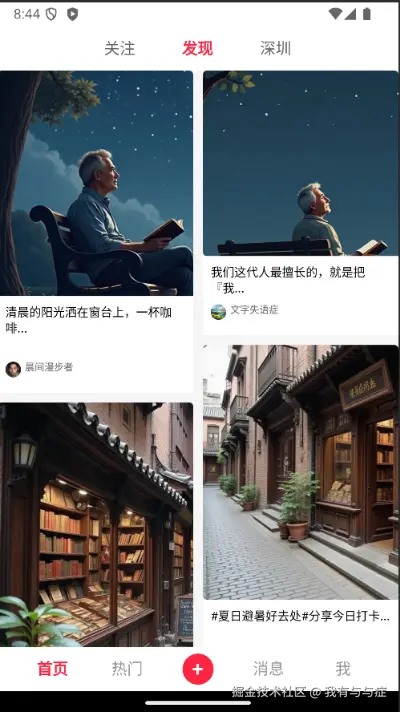
可以看到效果还是不错的!
2.3 页面布局优化
我们看到卡片中间有一大片的空白
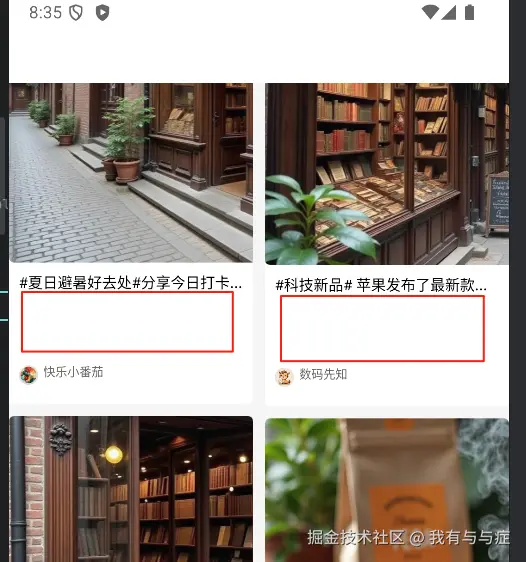
这是因为我们的卡片高度是随机生成的,但实际上卡片应该自动适应图片的文字和图片,我们可以使用Kuikly的flexDirectionColumn()属性,让高度自动适应
然后我们可以根据图片的比例和计算卡片高度:
根据公式:

可得

卡片的宽度就是页面宽度除以列数
代码如下:
kotlin
// 主图片
Image {
attr {
val cardWidth = ctx.pageViewWidth / ctx.columnCount // 计算单个卡片宽度
src(item.imageUrl)
borderRadius(4f)
flex(1f)
size(cardWidth, (item.imageHeight / item.imageWidth) * cardWidth) // 按照比例计算高度
}
} 最终效果如下
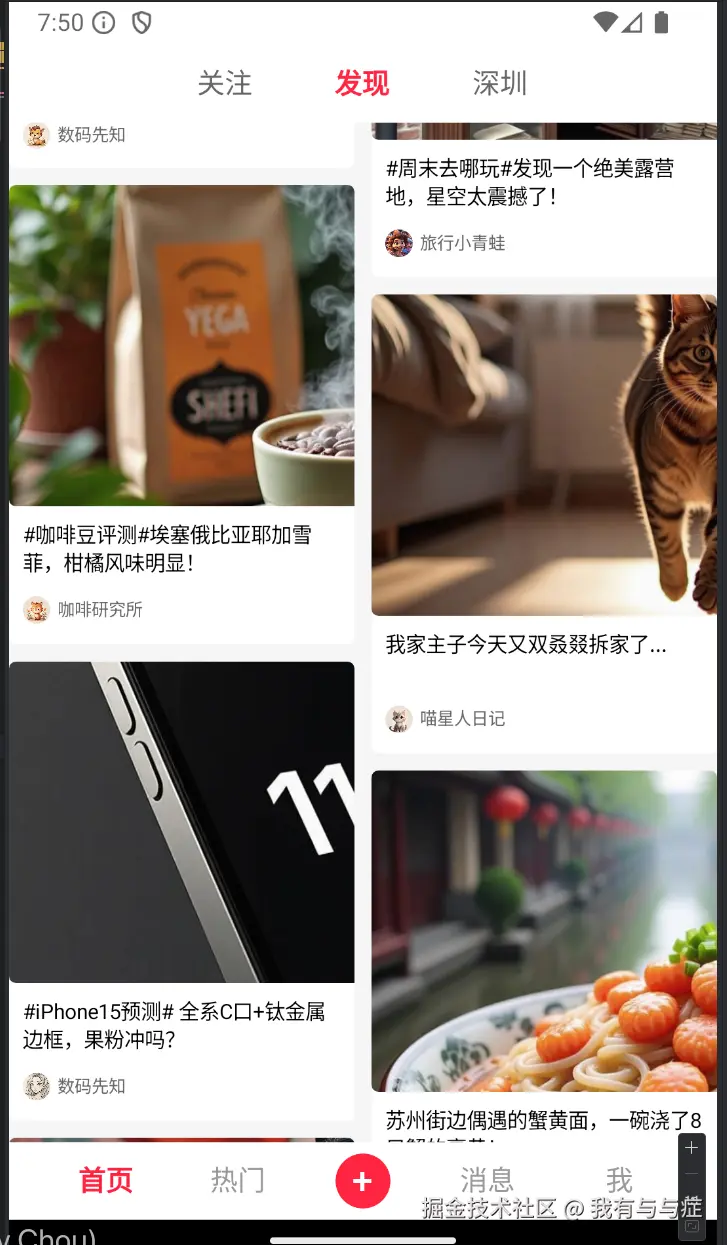
可以看到效果还是比较还原的。
通过搭建仿小红书App的首页,可以体会到Kuikly官方提供了许多的组件,官方的api文档接口也很详细,开发起来还是很流畅的。除了官方提供的组件外,我们也可以自定义组件,在后续内容会继续讲解。